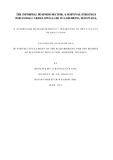| dc.contributor.advisor | | |
| dc.contributor.author | Batsalelwang, Kefilwe J. | |
| dc.date.accessioned | 2015-05-27T12:39:32Z | |
| dc.date.available | 2015-05-27T12:39:32Z | |
| dc.date.issued | 2015-05-27 | |
| dc.identifier.uri | http://hdl.handle.net/10311/1370 | |
| dc.description | A dissertation presented to the Faculty of Education, University of Botswana in partial fulfillment of the requirements for the Degree of Master of Education, (Gender Studies)
Citation: Batsalelwang, Kefilwe J. (2012) The informal business sector; a survival strategy for female urban dwellers in Gaborone, Botswana, University of Botswana | en_US |
| dc.description.abstract | This study has sought to find out why women are dominant in the informal sector and to establish the kind of support they get. The study is meant to suggest a paradigm shift in the formulation of strategies meant to alleviate poverty. The study established that generally women engage in the informal income generating activities with no other choice for livelihoods given their traditional role of caring and child rearing. In addition the study established that due to one size fits all kind of support systems, women in the informal business sector experience tripartite inequalities and remain marginalized.
The study has used the structure and agency theory, to shed light on how women show their agency in the informal business sector despite their marginalization. Although, they are conscious of the structures in place that limit women to penetrate the formal sector(which is male dominated), the informal business sector women show resilience in the informal business sector by enduring the barriers and persisting in business in order to provide for their families. While some of these women manage to provide for livelihoods only, others are already successful and advancing into entrepreneurship. To other women, the informal business sector is used as a platform to be autonomous and to break-away from male dominance.
Given that statistics show that women are in the largest population of the . unemployed, poor, and the informal business sector; the study therefore suggest that the sector be looked at as comprising of heterogeneous needs and as such inclusive plans be in place to cater for all the operators. Furthermore, women in the informal business sector should not only be looked as necessity entrepreneurs but as potential business women who deserve assistance. | en_US |
| dc.language.iso | en | en_US |
| dc.subject | Informal business sector | en_US |
| dc.subject | Gender issues | en_US |
| dc.subject | Women in business | en_US |
| dc.subject | Entrepreneurship | en_US |
| dc.subject | Botswana | en_US |
| dc.subject | Urban dwellers | en_US |
| dc.subject | Gender studies | en_US |
| dc.title | The informal business sector; a survival strategy for female urban dwellers in Gaborone, Botswana | en_US |
| dc.type | Masters Thesis/Dissertation | en_US |
| dc.rights.holder | University of Botswana | en_US |

